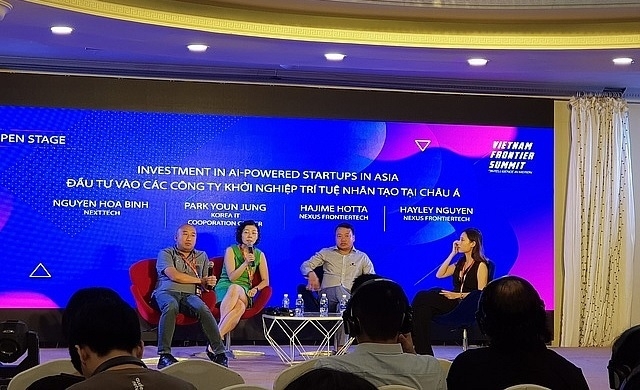Positioning AI startups for success
 |
| AI startups need more business knowhow to find their way to success. Source: Shutterstock |
Vietnam Frontier Summit (VFS) is an annual technology event co-organised by RubikAI, Nexus Frontier Tech, and VTV24. This year, the theme is “Intelligence in Motion”, and will provide a forum to connect individuals and AI startups with the world technology community to develop AI in Vietnam.
At the event, the panel on “Investment in AI-powered Startups in Asia” where Hajime Hotta, chief AI scientist of Nexus FrontierTech, Nguyen Hoa Binh, founder and president of NextTech, and Park Yun Jeong, director of the Korea IT Cooporation Center, shared their experiences with AI startups, captivated the audience.
President of NextTech, Nguyen Hoa Binh, shared, “AI might be important, but the question is can AI make money? Startups must be practical and use AI to make money.”
Binh also said that, "Vietnam has abundant and talented human resources thanks to focusing education on sciences. Vietnamese people are very good at logical thinking and mathematics, which is the basis for work in AI. The second point is that the Vietnamese economy has low labour productivity in the region which is an opportunity for AI to be used for improvement."
 |
| Hajime Hotta, chief AI scientist of Nexus FrontierTech (left), Park Yun Jeong, director of Korea IT Cooporation Center (green dress, middle), and Nguyen Hoa Binh, founder and president of NextTech at VFS 2019 (photo: CafeF) |
Besides opportunities, Binh also pointed out challenges for AI startups. Information, data, or big data are the capital goods for engineers to exploit. However, data is under the control of functional authorities such as the government, banks, large enterprises, or schools. Whether these units share their data with AI startups is always a point of uncertainty as startups have not found a common voice to treat with the government and traditional businesses.
In addition, AI startups are often founded and led by people of purely technical interests who do not know how to make money. AI will die alone if does not have the financial backing and is not backed up by a competent market development strategy. “The story here is that AI startups have to find a way to work with traditional businesses to identify problems and then apply AI to solve them and make money together. They should not only sell software, they should also help traditional businesses increase labour productivity," the president of NextTech said.
Recently, the words AI, big data, and blockchain are the keywords thrown around everywhere, even technology startups use them to mobilise capital. But not everybody really understands these keywords.
AI is the future and its application needs to be smarter by attaching it to real, workable business models. Many traditional businesses tried AI applications and found them inefficient.
According to Sang Shin, director of digital innovation at Temasek, “There’s more general interest in startups now than a few years ago. I think that interest is coming from corporations who are interested in looking at what startups are doing. There’s interest from perhaps even government areas to try and develop that part of their skillset, and i think some of the challenges lie in what we discussed at the event. This is not an overnight solution for any country, including Vietnam. The challenge is also imminent in understanding how not to just have the technical capability, but also the entrepreneur knowhow.”
The problem with AI right now is not the algorithm itself but the data source. Countries need to define policies on how to import and share data. Similar to what is happening with the banking system, there must be general rules that countries must follow. Data acts as currency in the AI ecosystem.
Temasek experts said that governments must understand the value of data and regulations on data sharing. In Singapore, the government works with Temasek to create a data sandbox for testing, combining private and public data to complement AI.
In addition to the discussion session between speakers, the event also gathered the breakthrough technology products made by local and overseas startups that stand at the forefront of the AI wave. Vietnam Frontier Summit 2019 was also a gathering place for leading technology experts discussing the core issues of AI and Industry 4.0, aiming to create a tight connection between managers, authorities, and technology startups.
The event welcomed more than 2,000 attendees, 35 showcases of AI products, and 40 guests, including the experts and representatives of companies applying AI into their operation.
What the stars mean:
★ Poor ★ ★ Promising ★★★ Good ★★★★ Very good ★★★★★ Exceptional
 Tag:
Tag:
Related Contents
Latest News
More News
- Masan Consumer names new deputy CEO to drive foods and beverages growth (February 23, 2026 | 20:52)
- Myriad risks ahead, but ones Vietnam can confront (February 20, 2026 | 15:02)
- Vietnam making the leap into AI and semiconductors (February 20, 2026 | 09:37)
- Funding must be activated for semiconductor success (February 20, 2026 | 09:20)
- Resilience as new benchmark for smarter infrastructure (February 19, 2026 | 20:35)
- A golden time to shine within ASEAN (February 19, 2026 | 20:22)
- Vietnam’s pivotal year for advancing sustainability (February 19, 2026 | 08:44)
- Strengthening the core role of industry and trade (February 19, 2026 | 08:35)
- Future orientations for healthcare improvements (February 19, 2026 | 08:29)
- Infrastructure orientations suitable for a new chapter (February 19, 2026 | 08:15)





















 Mobile Version
Mobile Version